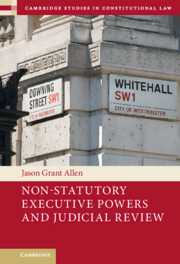Book contents
- Non-Statutory Executive Powers and Judicial Review
- Cambridge Studies in Constitutional Law
- Non-Statutory Executive Powers and Judicial Review
- Copyright page
- Dedication
- Contents
- Acknowledgements
- Table of Cases
- 1 Introduction
- 2 Official Action beyond Statute
- 3 The ‘Third Source’ in the Courts
- 4 A Unified Category of ‘Non-Statutory Executive Powers’
- 5 The Crown as Corporation
- 6 Public Law as the Law of Public Offices
- 7 Office in Action
- 8 Approaching Judicial Review
- 9 Competence, Conduct, and Validity
- 10 Moving beyond the Ultra Vires Debate
- 11 The Common Law Theory of Ultra Vires
- 12 The Borders of the Supervisory Jurisdiction
- 13 The Normative Foundations of Judicial Review
- Index
9 - Competence, Conduct, and Validity
Published online by Cambridge University Press: 18 August 2022
- Non-Statutory Executive Powers and Judicial Review
- Cambridge Studies in Constitutional Law
- Non-Statutory Executive Powers and Judicial Review
- Copyright page
- Dedication
- Contents
- Acknowledgements
- Table of Cases
- 1 Introduction
- 2 Official Action beyond Statute
- 3 The ‘Third Source’ in the Courts
- 4 A Unified Category of ‘Non-Statutory Executive Powers’
- 5 The Crown as Corporation
- 6 Public Law as the Law of Public Offices
- 7 Office in Action
- 8 Approaching Judicial Review
- 9 Competence, Conduct, and Validity
- 10 Moving beyond the Ultra Vires Debate
- 11 The Common Law Theory of Ultra Vires
- 12 The Borders of the Supervisory Jurisdiction
- 13 The Normative Foundations of Judicial Review
- Index
Summary
This chapter provides some more detail on the rules of competence and rules of conduct that empower officials to act as such and constrain the scope of their action. The logic of empowerment, and the fundamental distinction between ability and permission, provides a profound insight into the two traditional ‘limbs’ of the ultra vires rule – the ‘narrow’ limb concerned with competence, jurisdiction, or vires in the strict sense, and the ‘broad limb’ concerned with the manner, form, and purpose of an exercise of a competence that the official clearly does have. Not only does this provide a simple and powerful explanation for the ultra vires review of non-statutory executive powers; it provides the foundation for a general theory of judicial review based in the courts’ inherent (common law) jurisdiction to police the bounds of, and constraints upon, officials’ vires – whether statutory or non-statutory.
Keywords
Information
- Type
- Chapter
- Information
- Non-Statutory Executive Powers and Judicial Review , pp. 198 - 239Publisher: Cambridge University PressPrint publication year: 2022
